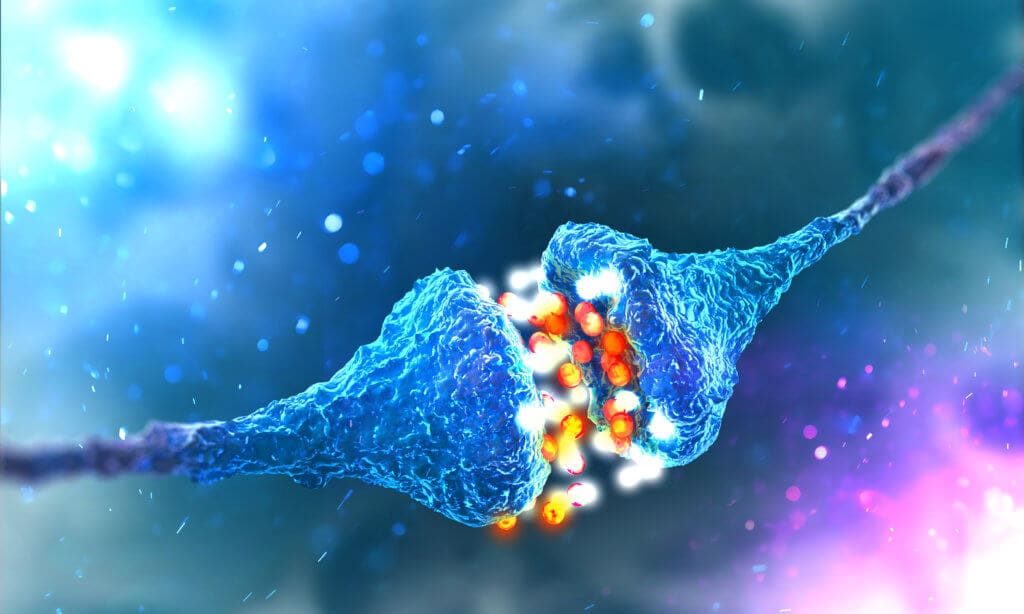- follow us:
Neurotransmitter Panel
For our Neurotransmitter Panel, 8 gene variants have been chosen by our experts to be analyzed for SNPs (single nucleotide polymorphisms).
A neurotransmitter imbalance can cause or contribute to the following problems:
- Persistent sadness or loss of interest
- Panic or fear states
- Attention deficits and hyperactivity
- Disorders associated with mood swings
- Sleeplessness
- Weight Issues
- Hormone and Adrenal Dysfunction
- Memory Issues
- Migraines / Headaches
The reports, created by our medical experts, will take your genetic results, and create nutritional and lifestyle recommendations along with recommended lab work and health precautions based upon many factors and our clinical expertise. The report will help provide recommendations for the proper nutrition and health advisements safely based on your DNA results.
Brain Chemistry of Neurotransmitters


Billions of neurons exist in the brain, and they all need to work appropriately. These cells share information with other nerve cells through electrical impulses, allowing for thought and communication throughout the body. Neurotransmitters inform many necessary processes like getting your heart to beat, your stomach to digest, or your lungs to breathe. While all neurotransmitters transmit information, they do not all do so in the same manner or with the same intention.
Serotonin & Dopamine - Technically the Only Two Things You Enjoy
There are “inhibitory” neurotransmitters and “excitatory” neurotransmitters. Inhibitory neurotransmitters work to counterbalance excitatory neurotransmitters and are considered the “feel-good” neurotransmitters. GABA, serotonin, and dopamine are among a few. They allow the brain to calm and feel balanced. Excitatory neurotransmitters are responsible for motivation, focus, anxiety, stress, and more. Norepinephrine and epinephrine (noradrenaline and adrenaline) are classified as excitatory, stimulating the brain.
Imbalance of Inhibitory & Excitatory Neurotransmitters
It’s not uncommon for the body to run out of inhibitory neurotransmitters when one has overactive excitatory neurotransmitters. When inhibitory and excitatory neurotransmitters are not working together and are imbalanced, moods like anger, agitation, anxiety, and lingering sadness can occur. Change in weight, sleep issues, and poor concentration can also be a byproduct. An estimated 86% of Americans have an imbalance between inhibitory and excitatory neurotransmitters.
Genes Associated With Depression & Neurotransmitter Dysfunction
Lingering sadness disorders are not genetically inherited, but the potential in each person is epigenetically modified by environment, stress, genetic makeup, and nutritional health. In the nutrigenomic world, the risk factors are associated with two genes that are associated with a higher risk of developing relative disorders. These genes do not guarantee any person will develop these disorders. The specific genes are the MAO and COMT. Both genes affect the speed at which neurotransmitters are broken down and cleared from the post synaptic receptor. In both MAO A and B homozygous and COMT homozygous, the mono-amines are cleared from the receptor site in a sluggish manner. This makes the post synaptic neuron less adaptable to changes in neurotransmitter status and leads to a higher likelihood of lingering sadness, loss of interest, and/or anxiety in that patient. By assisting these mutations with methyl donors (i.e., taurine, methionine, choline, inositol), the practitioner can speed the clearance of the neurotransmitters and lessen the likelihood of the symptoms.
How Our Neurotransmitter Panel Genetic Testing Can Help?
The issues that accompany an imbalance of inhibitory and excitatory neurotransmitters can be exacerbated by specific genetic SNPs in neurotransmitter markers like COMT, MAO-A, MAO-B, GAB 12. Drugs (recreational and/or prescription), neurotoxins, stress, alcohol, poor diet, and caffeine can also fuel symptoms by encouraging these SNPs to further express themselves.
Green Relief Health’s neurotransmitter genetic testing shares what SNPs you have within the neurotransmitter markers. This information allows Green Relief Health to recommend nutritional support specific to those genetic shortcomings. Ultimately, neurotransmitter genetic testing lets doctors and their patients understand their underlying issues with neurotransmitter function and implement personalized solutions.
Get A Neurotransmitter Panel Today
The power of Green Relief Health’s NutriGenomics testing will provide valuable information into potential reasons why as to why neurotransmitter issues may exist. By doing a simple cheek swab we can analyze each patient’s genetic blueprint to determine what diet and nutrients they need to maintain optimal health and wellness for the rest of their lives.
Green Relief Health can help you achieve a better understanding of your needs and success treating them by:
- Determining your unique genetic-based metabolic needs
- Providing you with the nutritional supplement(s) needed for each specific polymorphism (SNP)
- Taking the “guesswork” out of complex biochemical pathways
- Suggesting compressed formula options for better results and cost effectiveness
- Providing the necessary tools to build your knowledge base and expertise in your health
Learn More About Our Neurotransmitter Panel Testing Options
We know there’s no “one size fits all” when it comes to the needs of our patients. That’s why we pride ourselves in offering a range of genetic testing options. If you have any remaining questions about our Neurotransmitter Panel or are interested in learning about our different genetic testing options, we would be happy to meet with you at our office or virtually. Contact our team at Green Relief Health of Baltimore, MD today for your consultation!


